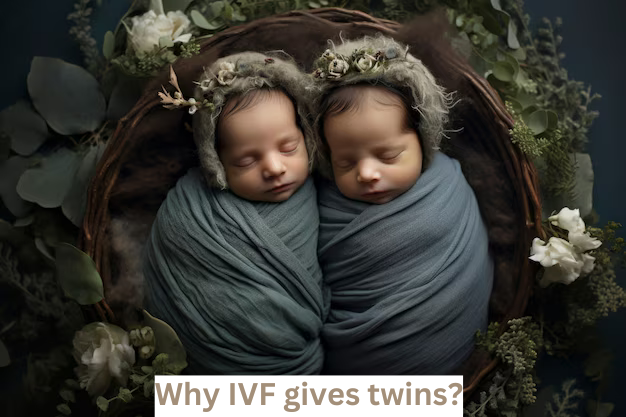Why IVF gives twins?
In-Vitro Fertilization (IVF) has revolutionized the landscape of fertility treatments. While it's a powerful tool to help countless couples conceive, one common outcome of IVF is the birth of twins. Let's delve into the reasons behind this phenomenon and explore the factors contributing to multiple births in IVF cycles.
Understanding IVF
Before we dive into the reasons for twin births, let's briefly recap the IVF process. IVF involves several steps:
Ovulation Stimulation: Hormones are administered to stimulate the ovaries to produce multiple eggs.
Egg Retrieval: Mature eggs are retrieved from the ovaries.
Fertilization: Eggs are fertilized with sperm in a laboratory dish.
Embryo Culture: Fertilized eggs (embryos) are cultured for a few days.
Embryo Transfer: One or more embryos are transferred to the uterus.
Why Twins?
Several factors contribute to the increased likelihood of twins in IVF cycles:
1. Multiple Embryo Transfer (MET):
Historically, the standard practice was to transfer multiple embryos to improve the chances of pregnancy.
However, this practice often led to higher rates of multiple births, including twins.
Today, single embryo transfer (SET) is increasingly becoming the preferred approach, especially in cases with good-quality embryos.
2. Hormonal Stimulation:
The hormonal stimulation used to induce ovulation can sometimes lead to the development of multiple follicles, which can result in multiple eggs being retrieved.
If multiple eggs are fertilized and transferred, the chances of a twin pregnancy increase.
3. Embryo Splitting:
While not a common practice, embryo splitting involves dividing a single embryo into two or more embryos.
This technique is still experimental and carries risks, but it could theoretically lead to twins or higher-order multiples.
4. Natural Tendency:
Some individuals may have a natural tendency to produce multiple eggs, which can increase the likelihood of twins, even in natural conception.
This genetic predisposition can also influence the outcome of IVF cycles.
The Risks and Rewards of Multiple Births
While the birth of twins can be a joyous occasion, it's important to acknowledge the potential risks associated with multiple pregnancies:
Premature Birth: Twins are more likely to be born prematurely, which can lead to various health complications.
Low Birth Weight: Twins often have lower birth weights compared to singletons, increasing the risk of health issues.
Increased Maternal Risks: Multiple pregnancies can pose higher risks to the mother, including gestational diabetes, preeclampsia, and other complications.
However, the advancements in medical care and the increasing focus on single embryo transfer have helped reduce the incidence of higher-order multiples and improve the overall outcomes for both mothers and babies.
Conclusion
While IVF offers a beacon of hope for many couples struggling with infertility, it's essential to weigh the potential risks and benefits of multiple births. By understanding the factors contributing to twin pregnancies and opting for evidence-based practices like single embryo transfer, couples can increase their chances of a healthy singleton pregnancy.
Frequently Asked Questions (FAQ)
1. What is the main reason IVF results in twins?
The primary reason IVF often leads to twins is the transfer of multiple embryos into the uterus. To increase the chances of a successful pregnancy, fertility specialists may implant two or more embryos during the IVF process.
2. Does transferring more embryos guarantee a twin pregnancy?
While transferring multiple embryos increases the likelihood of twins, it does not guarantee it. Factors such as embryo viability, implantation rates, and individual patient conditions play a significant role in determining the outcome.
3. How do fertility medications influence the chances of twins?
Fertility medications used during IVF stimulate the ovaries to produce multiple eggs. This can result in multiple embryos being available for transfer, increasing the chances of a twin or multiple pregnancies.
4. Are there any risks associated with having twins through IVF?
Yes, twin pregnancies can carry higher risks for both the mother and babies, including premature birth, low birth weight, and gestational diabetes. At New World Fertility Centre, we provide comprehensive counseling to help patients understand these risks.
5. How does age affect the likelihood of twins during IVF?
Women over 35 may be more likely to produce multiple eggs during IVF due to hormonal factors. This increases the chances of fertilizing more than one egg, which can lead to twins.

 Oct-29-2024
Oct-29-2024